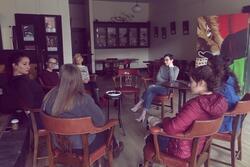Reclaiming “Bossy”: How Sexism Shaped Who I Am
For my whole life, I’ve been haunted by one word. A word that evokes anger, frustration, and embarrassment. A word that mocked me throughout my childhood. A word that tried to tear me down.
That word is “bossy.”
As a child, I was loud and outspoken. I prided myself on my intelligence and eagerness to learn; I truly had killer confidence. I told people I was going to be “the dictator of the world” when I grew up. But as time went on, it became increasingly apparent that the education system didn’t have room for a personality like mine. Well, at least when that personality belonged to a girl.
My personality was especially unfit for group work, as I realized early on in elementary school. My first experiences with group work were all very similar: We began the project, I naturally took charge, we completed the work, and then my classmates sold me out. “Lila did the whole thing. She’s too bossy.” In some cases, they would throw around “bossy” during the process: “You’re so bossy. You tell us all what to do.” And to be fair, I did lead most of my groups. In my mind, if I didn’t take the lead, nothing would get done. Even when I attempted to allow others to take initiative, they still called me “bossy.” As a result, I dreaded group work.
“Bossy” continued to torture me throughout middle school. During the awkward stages of puberty, I was called “bossy” in every discussion and project, which humiliated me. My stomach churned at the mention of a book discussion. I broke out into a cold sweat when it was time to peer edit. Don’t even get me started on group projects. The continuous ridicule I faced in these situations silenced me. I suppressed my leadership skills to avoid being noticed, and it worked. By the end of middle school, “bossy” was barely used to describe me. Probably because I barely said a word.
In 8th grade, my mom showed me a quote from Sheryl Sandberg’s 2013 Ban Bossy campaign.
It read, “I want every little girl who someone says ‘they're bossy’ to be told instead, ‘you have leadership skills.’”
That quote put things in perspective for me. I mean, have you ever heard a boy get called “bossy”? I sure haven’t. Boys called me “bossy.”
That my female identity harms my education was a harsh realization. Even more upsetting was the idea that my identity was to blame for years of insecurity and humiliation. I knew I couldn’t keep changing myself to fit society’s standards for a teenage girl. I made efforts to regain my voice and courage; I spoke in class discussions and I asked questions when necessary. I wanted to return to my bold five-year-old self.
I wish I could say that the quote changed my life, that it mended every wound and reversed every problem, that I regained my confidence and determination, but none of this happened. It did change my perspective in that it helped me understand why the word “bossy” was used to target me, but my battle with sexism in the classroom was far from over. Sexism crept behind me all the way into high school. Sexism had its hands on my throat at all times. Sexism told me to be quiet, to be submissive, and not to question it. It cornered me when I was at my most insecure. And with regard to school, I was at my most insecure in math.
In my freshman geometry class, I remember noticing a clear difference in the way my teacher spoke to male versus female students. Male students could easily retrieve missed work and schedule tests. Female students were ignored and disrespected while trying to do the exact same things. In my algebra class the following year, I recognized the same pattern. Because I struggled with math, I frequently asked questions in class. Male students in my class would mock me and make comments about how stupid I was. When I questioned their work, they disregarded me and made me feel unworthy of education as a whole. It seemed as though no matter how loud my voice was or how much space I took up, things couldn’t change. I would always be “bossy.” I would always be stupid. I would never be enough. I would never be worthy. Frustrated and confused, I slowly began to sink back into my old habits of silencing my voice to make room for the seemingly more important ones.
But that didn’t feel right. Every Jewish program I’ve participated in (and trust me, I’ve participated in a lot) emphasizes the acquiring and mastering of leadership skills —the same skills I was born with, the same skills I was humiliated for. They were valuable skills! People want to learn how to be “bossy”! Silence was no longer an option. I honed in on my leadership abilities. Practicing and perfecting, I used my youth board experiences to refine my craft. I was born a leader, why should I be ashamed? Why should I hide that? To me, “bossy” is no longer an insult. “Bossy” is a celebration of me: what I was born with and what I have learned.
To every girl that has ever been called “bossy,” you are. You are strong enough to take the lead. You are intuitive enough to reason through problems. You are determined enough to set goals and achieve them. You are trustworthy. You are a leader. You are a fighter. “Bossy” girls aren’t just awkward middle schoolers. “Bossy” girls are CEOs. “Bossy” girls are Supreme Court Justices. “Bossy” girls are everywhere. And “bossy” girls are incredible. Trust me, I’m one of them.
So, I reclaimed bossy. And I never looked back.
This piece was written as part of JWA’s Rising Voices Fellowship.








Hi Lila,
That was an awesome reveal. I was touched as I read your story. ..I am truly sorry you suffered so painfully in school. For various times in my life I was a substitute Teacher, and I saw young women like you, Black White Latina Jewish etc etc... a very real patina of young women "with leadership skills" and I spoke your truth to them because it was my truth as well. And what Judaism and JWA has to offer us just real people.. "Bossy Girls" are are the life skills, a road map of sorts, that we need to be fully present on our journey. Remember what our Grandmothers did when they got here..they got an eduction how ever they could, they organized, they built businesses and all those "Bossy Women" were engaged in the process of changing the World from modest to awesome contributions. Tikun Olam....
.Keep speaking out...I look forward to hearing your future views of the world.
I am 70 years old and give you the "left of center" Jewish, Educated, Gay Baby Boomer view of the world. I study Mussar. In reading your blog, I realized I would highly recommend this ancient practice be explored.... Previously ONLY studied by boys and men...NOW studied by seniors, and hopefully a new generation of women living up to their potential of feeling and owning being powerful, strong/gentle, honorable, assertive, and being a bit of a Kick Tush Knd of Woman.
*.Pls note it's a fluid thing)
yes queen!
I truly enjoyed reading about your truth Lila although some of your experiences made my heart hurt. Unfortunately we live in a world full of equality but I’m confident that people like you will rise up to make the necessary changes. I am proud to call you my niece and I have always recognized your leadership skills. I would be disappointed if you ever let anyone curtail your endless potential.